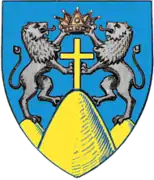Câmpulung Moldovenesc
Câmpulung Moldovenesc (also spelled Cîmpulung Moldovenesc; Romanian pronunciation: [kɨmpuˌluŋɡ moldoveˈnesk]) is a city in Suceava County, north-eastern Romania. It is situated in the historical region of Bukovina.
Câmpulung Moldovenesc | |
|---|---|
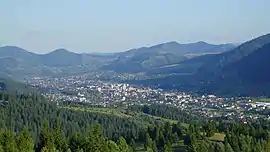 View of the city from Obcina Feredeului | |
 Coat of arms | |
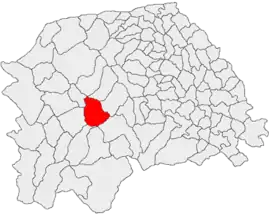 Location in Suceava County | |
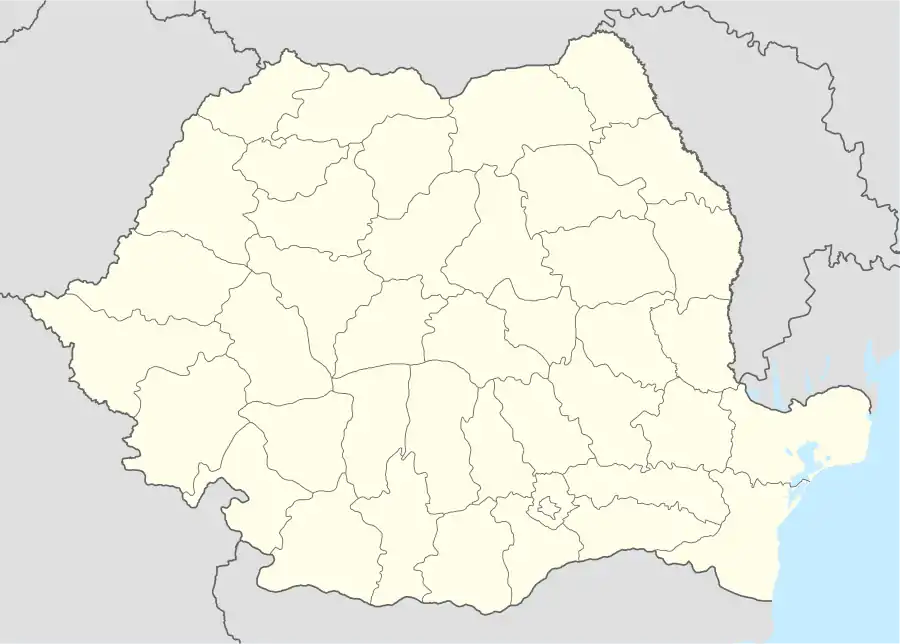 Câmpulung Moldovenesc Location in Romania | |
| Coordinates: 47°31′51″N 25°33′5″E | |
| Country | |
| County | Suceava |
| Government | |
| • Mayor | Mihăiță Negură[1] (PNL) |
| Area | 147.00 km2 (56.76 sq mi) |
| Population (2011)[2] | 16,722 |
| • Density | 110/km2 (290/sq mi) |
| Time zone | EET/EEST (UTC+2/+3) |
| Vehicle reg. | SV |
| Website | Official site |
Câmpulung Moldovenesc is the fourth largest urban settlement in the county, with a population of 16,105 inhabitants, according to the 2011 census. It was declared a municipality in 1995, along with two other cities in Suceava County: Fălticeni and Rădăuți. Câmpulung Moldovenesc covers an area of 147 km2 and it was the capital of former Câmpulung County (until 1950).
Other names
The city is also known as Hosszúmező in Hungarian, Kimpulung Moldovanesk (Кимпулунг Молдованеск) in Ukrainian, and Dovhopillja in Serbian.
Administration and local politics
Town council
The town's current local council has the following political composition, according to the results of the 2016 Romanian local elections:
| Party | Seats | Current Council | ||||||||||||
|---|---|---|---|---|---|---|---|---|---|---|---|---|---|---|
| National Liberal Party (PNL) | 12 | |||||||||||||
| Social Democratic Party (PSD) | 4 | |||||||||||||
| Alliance of Liberals and Democrats (ALDE) | 2 | |||||||||||||
| Independent | 1 | |||||||||||||
Geography
Câmpulung Moldovenesc is situated in the region of Bukovina, in north-eastern Romania. The city is located in the mountain area of Obcinele Bucovinei, on the banks of the Moldova River.
Câmpulung Moldovenesc is accessible by both car and train. The European route E58, that links the region of Moldavia with Transylvania, crosses the city. There are two railway stations located in the city: Câmpulung Moldovenesc in the city center and Câmpulung Est in Capu Satului neighborhood.
There are many places of interest located in and around Câmpulung Moldovenesc, such as Rarău and Giumalău, which at 1650 meters and 1857 meters are the highest peaks in the region. One can also enjoy the forests which surround Câmpulung Moldovenesc or visit a monastery in one of the nearby villages.
History
.png.webp)
The first written mention of the village of Câmpulung Moldovenesc dates back to April 14, 1411. At that time the ruling prince of Moldavia was Alexandru cel Bun. Dimitrie Cantemir, in his well-known work Descriptio Moldaviae, mentions Ocolul Câmpulung, an autonomous region in northern Moldavia that has its own rules and leaders. This region consisted of 15 villages.
Together with the rest of Bukovina, Câmpulung Moldovenesc was under the rule of the Habsburg Monarchy (later Austria-Hungary) from 1775 to 1918. Câmpulung was in the Austrian part of the empire after the compromise of 1867, head of the district with the same name, one of the 9 Bezirkshauptmannschaften in Bukovina province.[3] Other main district cities were Dorna Watra (Vatra Dornei) and Wama (Vama) in 1900.[4]
Later, between 1925 and 1950, Câmpulung Moldovenesc was the capital of the former Câmpulung County, the most extensive county in Bukovina. The spa and ski resort Vatra Dornei was the second most important town in Câmpulung County.
Demographics
| Year | Pop. | ±% |
|---|---|---|
| 1910 | 8,784 | — |
| 1930 | 10,071 | +14.7% |
| 1948 | 11,041 | +9.6% |
| 1956 | 13,627 | +23.4% |
| 1966 | 15,031 | +10.3% |
| 1977 | 18,648 | +24.1% |
| 1992 | 22,143 | +18.7% |
| 2002 | 20,041 | −9.5% |
| 2011 | 16,105 | −19.6% |
| 2016 | 20,139 | +25.0% |
| Source: Austrian and Romanian census data and/or official estimates | ||
Câmpulung Moldovenesc reached its peak population in 1992, when more than 22,000 people were living within the city limits. As of 2016, the town of Câmpulung Moldovenesc is the fourth largest urban settlement in Suceava County, after the county capital, Suceava, and the larger towns of Rădăuți and Fălticeni.[5]
At the 2011 census, Câmpulung Moldovenesc had a population of 16,105 inhabitants: 99.08% of inhabitants were ethnic Romanians, 0.25% Germans (Bukovina Germans), 0.22% Roma, 0.17% Ukrainians and 0.09% Hungarians.
Economy
The main industries in Câmpulung Moldovenesc are dairy products, lumber, and ecotourism. Part of the city inhabitants works in agriculture and bovine growth.
"Câmpulung" means "Long Field" in Romanian. Moldovenesc ("Moldavian") is used to differentiate between this city and Câmpulung Muscel (Argeș County, Wallachia).
Natives
- Maria Diaconescu (born 1937) - javelin thrower
- Vasile Gheorghiu (1872–1959) - theology professor, academician
- Leibu Levin (1914–1983) - narrator of Yiddish literature, singer and composer
- Anca Parghel (1957–2008) - jazz singer, musician
- Daniel Popescu (born 1981) - politician
- Ion Ștefureac (1871–1920) - professor, architect
Gallery
 Mountainous landscape near the town
Mountainous landscape near the town The Central Train Station
The Central Train Station Bogdan Vodă School
Bogdan Vodă School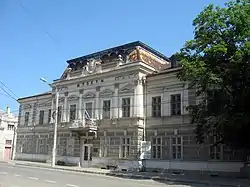 Wood Art Museum
Wood Art Museum The Post Office
The Post Office The Romanian Commercial Bank
The Romanian Commercial Bank Central square in Câmpulung Moldovenesc
Central square in Câmpulung Moldovenesc Downtown Câmpulung Moldovenesc
Downtown Câmpulung Moldovenesc Dragoș Vodă and the Bison Statue
Dragoș Vodă and the Bison Statue The Roman Catholic Church
The Roman Catholic Church The Orthodox Cathedral
The Orthodox Cathedral Havre Gah Jewish Temple
Havre Gah Jewish Temple
References
- "Results of the 2016 local elections". Central Electoral Bureau. Retrieved 3 April 2020.
- "Populaţia stabilă pe judeţe, municipii, oraşe şi localităti componenete la RPL_2011" (in Romanian). National Institute of Statistics. Retrieved 4 February 2014.
- Die postalischen Abstempelungen auf den österreichischen Postwertzeichen-Ausgaben 1867, 1883 und 1890. Wilhelm Klein, 1967.
- Bukowina 3 district, rarity Points less than 10. Wilhelm Klein, 1967.
- "Populaţia României pe localitati la 1 ianuarie 2016" (in Romanian). INSSE. 6 June 2016. Archived from the original on 2017-10-27. Retrieved 27 October 2017.
External links
| Wikimedia Commons has media related to Câmpulung Moldovenesc. |
- (in Romanian) Câmpulung Moldovenesc Town Hall official site
- (in Romanian) Ştefan cel Mare Military High School, Câmpulung Moldovenesc
- (in Romanian) Dragoş Vodă National High School, Câmpulung Moldovenesc
- (in Romanian) Bucovina Forestry High School, Câmpulung Moldovenesc
- (in Romanian) Suceava County site - Câmpulung Moldovenesc web page
- (in Romanian) Photo Gallery - Old photos of Câmpulung Moldovenesc
- (in Hebrew) Kimpolung-Bukovina Jewish Community
